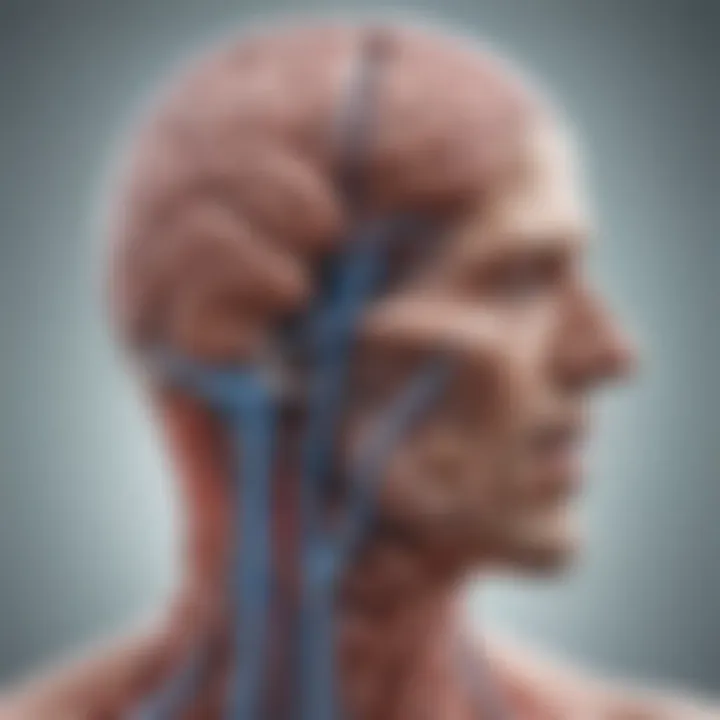Exploring Alcohol's Effects on Thyroid Health


Intro
Alcohol consumption is a prevalent aspect of many cultures, often intertwined with social activities and personal habits. However, the implications of alcohol for health are paramount. One area of concern is its relationship with thyroid functionality, an endocrine system component crucial for metabolic processes. Understanding how alcohol influences thyroid health can be essential for those managing existing thyroid conditions or simply seeking to maintain their overall wellness.
Research Overview
Summary of Key Findings
Recent research highlights significant interactions between alcohol and thyroid hormone production. Several studies indicate that excessive alcohol consumption may lead to alterations in thyroid hormone levels, particularly reducing the production of thyroxine (T4). This hormone is critical for metabolic regulation, and its deficiency can lead to various health issues, including fatigue, weight gain, and depression.
Additionally, alcohol has been observed to exacerbate existing thyroid disorders such as hypothyroidism and Graves' disease. Those with these conditions may experience symptoms like increased heart rate, anxiety, and disruption in mood due to alcohol’s influence on thyroid function.
Importance of the Research
Understanding the impact of alcohol on thyroid health is increasingly relevant as rates of alcohol consumption rise globally. Many individuals may not be aware of how their drinking habits could be affecting their thyroid health. For healthcare professionals, this knowledge can improve patient care by guiding dietary recommendations and addressing lifestyle factors that could impede thyroid function.
This research lays a foundation for further exploration into the biochemical interactions of alcohol on the thyroid axis.
Methodology
Study Design
Most studies conducted on this topic typically employ observational designs, analyzing populations with varied alcohol consumption levels. Cross-sectional studies often provide insights into the immediate impacts of alcohol on thyroid hormone markers, while longitudinal studies can reveal trends over time.
Data Collection Techniques
Data is gathered through a combination of surveys and physiological assessments, including blood tests to measure hormone levels such as TSH, T3, and T4. Self-reported alcohol consumption data is also collected, often categorized by frequency and quantity.
The combination of these methods allows researchers to establish correlations and hypothesize about causative effects. Importantly, knowledge of alcohol's influence on thyroid function remains crucial, as it aids in fostering awareness among healthcare providers and patients alike.
Prelims
Understanding the interplay between alcohol consumption and thyroid health is critical. The thyroid gland is responsible for producing hormones that regulate metabolism, energy generation, and overall body function. Disruptions in thyroid function can lead to numerous health issues, emphasizing the need for awareness about factors affecting this gland.
This article discusses significant elements of how alcohol impacts thyroid function. First, we will define thyroid health, explaining the importance of maintaining balanced hormone levels. Next, we will provide an overview of alcohol consumption habits and their prevalence in different demographics. By elucidating these points, we lay the groundwork for understanding potential implications of alcohol on thyroid-related health concerns. This exploration is particularly beneficial for students, researchers, and health professionals who seek clarity on this complex relationship.
Defining Thyroid Health
Thyroid health encompasses the proper functioning of the thyroid gland, located at the base of the neck. This small gland plays a disproportionate role in bodily functions, primarily by producing hormones such as thyroxine (T4) and triiodothyronine (T3). These hormones are critical for regulating metabolism, influencing everything from heart rate to weight management.
A healthy thyroid ensures optimal hormone production. Various factors can influence thyroid function, including diet, environment, and lifestyle. It is important to identify signs of thyroid dysfunction, which may include fatigue, weight fluctuations, and mood changes. Regular screenings and blood tests can help in assessing thyroid health, allowing for early intervention if necessary.
Overview of Alcohol Consumption
Alcohol consumption varies widely across different cultures and age groups. In many societies, moderate drinking is socially acceptable and often integrated into various traditions. However, the definitions of moderate and excessive consumption can differ significantly.
Worldwide, alcohol is consumed in various forms such as beer, wine, and spirits. According to studies, significant alcohol use is often paired with an increased risk of health issues, including liver disease and dependencies. The prevalence of alcohol-related problems is pervasive, affecting both mental and physical health.
Understanding current trends in alcohol consumption is essential. It informs healthcare providers about potential risks associated with high alcohol intake among populations, particularly those with existing thyroid issues.
"Alcohol can have various effects on the endocrine system, making understanding its impact on thyroid function crucial for maintaining overall health."
Thorough awareness and education on alcohol consumption can contribute to better health outcomes, especially for individuals susceptible to endocrine-related disorders.
Thyroid Function


Thyroid function is a critical component of overall health and well-being. The thyroid gland, located in the neck, plays a vital role in regulating numerous bodily processes, including metabolism, growth, and energy levels. Understanding thyroid function is essential, especially in the context of alcohol consumption. Alcohol can significantly affect thyroid physiology and exacerbate thyroid disorders. This section will delve into the various aspects of thyroid function, focusing on the specific elements that highlight its importance.
Role of the Thyroid Gland
The thyroid gland is responsible for producing hormones that regulate metabolism and maintain homeostasis in the body. It is sometimes referred to as the body’s metabolic engine. This small butterfly-shaped gland influences various functions, including heat regulation, heart rate, and cholesterol levels. When alcohol enters the body, it can alter the production and activity of these hormones, leading to a cascade of physiological effects.
Hormones Produced by the Thyroid
The thyroid gland primarily produces three hormones: thyroxine (T4), triiodothyronine (T3), and calcitonin. Each plays a unique role in different aspects of body functioning. Understanding these hormones is essential when considering the effects of alcohol on thyroid function.
Thyroxine (T4)
Thyroxine, also known as T4, is synthesized in the thyroid and is a critical hormone for regulating metabolism. About 90% of the hormones produced by the thyroid are T4. Its chief characteristic is that it is converted into the more active T3 in organs like the liver and kidneys. This conversion process is important for maintaining energy levels and overall metabolism. The unique feature of T4 is its longer half-life compared to T3, making it a stable hormone in circulation. However, excessive alcohol consumption can inhibit the conversion of T4 to the more active T3, potentially leading to metabolic imbalances.
Triiodothyronine (T3)
Triiodothyronine, or T3, is considered the most potent hormone produced by the thyroid gland. It plays a critical role in metabolism, influencing how cells in the body utilize energy. One notable characteristic of T3 is its rapid action; it can affect tissues almost immediately after release. This speed is beneficial for the body’s metabolic processes. Nevertheless, alcohol can disrupt the synthesis of T3, leading to a possible deficiency that may cause fatigue and weight gain.
Calcitonin
Calcitonin is another hormone produced by the thyroid, although its role is somewhat less clear compared to T3 and T4. It primarily regulates calcium levels in the blood, helping to maintain bone health. The key characteristic of calcitonin is its ability to lower blood calcium levels. While it is not directly involved in metabolic processes, its proper function is still important for overall bodily health. Alcohol's potential interference with calcium regulation could influence bone health and metabolism indirectly.
Regulation of Thyroid Hormones
Regulation of thyroid hormones is a complex process, involving the hypothalamic-pituitary-thyroid axis. This feedback loop ensures that hormone levels remain stable and respond appropriately to the body's needs. Alcohol can disrupt this regulatory mechanism, leading to abnormal hormone levels. Chronic alcohol consumption may lead to hypothyroidism or alter how the thyroid gland responds to the hormones that trigger its activity. Understanding these dynamics is crucial for individuals, especially those with existing thyroid disorders, as they may be more susceptible to the negative influence of alcohol on their thyroid function.
Effects of Alcohol on the Endocrine System
Understanding the effects of alcohol on the endocrine system is crucial for those interested in hormone health, particularly regarding thyroid function. The endocrine system plays a major role in regulating various body functions through hormone production and secretion. Alcohol influences this system in multiple ways, leading to significant physiological changes. Chronic alcohol consumption can disrupt hormonal balance, which is particularly relevant for individuals with pre-existing thyroid conditions.
As alcohol is metabolized in the body, it can affect hormone regulation, leading to unwanted consequences. It is essential to understand how alcohol impacts this delicate system to make informed choices about consumption and its implications for health.
Alcohol Metabolism and Hormonal Impact
Alcohol metabolism primarily occurs in the liver. Here, it is converted to acetaldehyde through the action of enzymes such as alcohol dehydrogenase. Acetaldehyde is then further broken down into acetate. This metabolic process takes priority over other biochemical pathways, thus affecting the metabolism of hormones like thyroid hormones.
When alcohol is consumed, it can lead to increased estrogen levels and decreased testosterone levels due to its effects on liver enzymes. Higher estrogen levels can produce a feedback mechanism, which may inhibit the production of thyroid hormones.
Key Implications:
- Altered Hormonal Levels: Alcohol can cause shifts in estrogen and testosterone that may influence thyroid hormone secretion.
- Hormonal Resistance: Prolonged exposure might induce resistance to hormones, complicating underlying endocrine issues.
Impact on the Hypothalamic-Pituitary-Thyroid Axis
The hypothalamic-pituitary-thyroid axis is a complex regulatory system that governs thyroid hormone production. Alcohol consumption can disturb this axis, leading to decreased stimulation of the thyroid gland. The hypothalamus releases thyrotropin-releasing hormone, which signals the pituitary gland to secrete thyroid-stimulating hormone.
Excessive alcohol consumption can inhibit this signaling pathway, negatively impacting the synthesis of thyroid hormones. This has potential implications for overall metabolic regulation and energy balance in the body.
Important Considerations:
- Feedback Mechanisms: Disruption of normal hormonal feedback can exacerbate conditions like hypothyroidism.
- Long-term Effects: Chronic intake might lead to persistent dysregulation in thyroid function which can hinder treatment responses for individuals with thyroid disorders.
"Understanding how alcohol interacts with hormone systems can empower individuals to make more informed choices, especially those managing existing endocrine disorders."
Overall, recognizing the impact of alcohol on the endocrine system highlights the need for moderation. Identifying these disruptions can be beneficial for individuals seeking to maintain or improve thyroid health.


Alcohol and Thyroid Hormone Production
The relationship between alcohol consumption and thyroid hormone production is significant due to its implications for overall endocrine health. Thyroid hormones play a critical role in regulating metabolism, growth, and development. Understanding how alcohol affects these hormones is relevant for individuals who consume alcohol and are concerned about their thyroid health. The discussion about alcohol and thyroid hormone production is particularly useful for those diagnosed with thyroid disorders or those at risk.
Inhibition of Thyroid Hormones Synthesis
Alcohol has been shown to inhibit the synthesis of thyroid hormones directly. This occurs through several mechanisms. First, alcohol disrupts the normal metabolic processes within the thyroid gland. Ethanol, the active component in alcoholic beverages, can interfere with the enzymatic actions necessary for hormone production. For instance, it can inhibit the iodination of tyrosine, which is essential for the synthesis of thyroxine (T4) and triiodothyronine (T3).
This inhibition often leads to a reduction in circulating levels of T4 and T3. When these hormones are low, it can manifest as hypothyroid symptoms, including fatigue, weight gain, and depression. Some studies suggest that chronic alcohol consumption may also lead to the development of goiter, an enlargement of the thyroid gland, as the body attempts to compensate for low hormone levels.
Additionally, the impact of alcohol may vary depending on the amount consumed. Moderate drinking might have minimal effects, whereas chronic heavy drinking could lead to more pronounced inhibition. Hence, understanding one’s alcohol intake is crucial for maintaining thyroid health.
Potential for Altered Hormonal Ratios
Another critical aspect is the potential for altered hormonal ratios as a result of alcohol consumption. In a healthy individual, the balance between T4 and T3 is vital for maintaining metabolic homeostasis. Alcohol consumption can disrupt this balance by not only reducing the synthesis of these hormones but also affecting their conversion.
The liver plays a key role in converting T4 to the more active form, T3. Alcohol can obscure this conversion process, leading to an increase in T4 levels while T3 levels may decrease. This alteration in hormonal ratios can lead to a condition known as thyroid hormone resistance. In this state, target tissues become less responsive to thyroid hormones, compounding the issues associated with thyroid dysfunction.
Overall, the impact of alcohol on thyroid hormone production is multifaceted, encompassing both inhibition of synthesis and alteration of hormonal ratios. Recognizing these effects is crucial for individuals concerned with their thyroid health.
"Chronic alcohol consumption represents a risk for thyroid disorders, making awareness of its effects on hormone production essential for both patients and healthcare providers."
Alcohol Consumption and Thyroid Disorders
Understanding the intricate relationship between alcohol consumption and thyroid disorders is crucial for both health professionals and individuals managing these conditions. Alcohol has significant effects on various physiological systems, and the thyroid is no exception.
Excessive alcohol intake can lead to hypothyroidism, characterized by insufficient hormone production, effects that could be potentially debilitating. In contrast, the role of alcohol in hyperthyroidism is less understood, although some evidence suggests that certain consumption patterns may also influence this condition. Therefore, addressing these interactions is essential for comprehensive thyroid health management.
Some key points to consider in this discussion include:
- Hormonal Imbalance: Alcohol may disrupt the delicate balance of thyroid hormones, which can worsen existing disorders.
- Nutritional Deficiencies: Heavy drinking affects nutrient absorption and can result in deficiencies that impact thyroid function.
- Metabolic Effects: Alcohol alters metabolic processes affecting how the body regulates thyroid hormones.
- Individual Variability: Each person's reaction to alcohol can vary, leading to different impacts on thyroid health.
The implications of alcohol consumption on thyroid function are indeed multi-faceted, warranting closer examination and awareness for those facing these health challenges.
Correlation with Hypothyroidism
Clinical evidence increasingly points toward a connection between alcohol consumption and hypothyroidism. Several studies suggest that individuals with a high intake of alcohol may present with lower levels of thyroid hormones such as TSH, T3, and T4. This correlation can be explained through multiple mechanisms:
- Inhibition of Hormone Production: Chronic alcohol use has been demonstrated to inhibit thyroid hormone synthesis, potentially due to effects on the hypothalamic-pituitary-thyroid (HPT) axis.
- Alcohol-Induced Liver Dysfunction: The liver plays a vital role in hormone metabolism. High alcohol intake may lead to liver impairment, which in turn affects thyroid hormone levels.
- Autoimmune Responses: Alcohol can influence autoimmune diseases, such as Hashimoto's thyroiditis, which is a common cause of hypothyroidism.
Research indicates a compelling link that necessitates cautious consumption for those susceptible to or currently managing hypothyroidism.
Potential Link to Hyperthyroidism
While less documented than hypothyroidism, there is emerging interest in how alcohol may contribute to hyperthyroidism. Although findings are inconsistent, some studies indicate that excessive alcohol consumption could either trigger hyperthyroid episodes or exacerbate symptoms in predisposed individuals.
- Stimulation of Thyroid Activity: Alcohol might stimulate increased production of thyroid hormones in some individuals, potentially leading to hyperthyroid symptoms.
- Appetite and Weight Management: Alcohol can affect appetite regulation and weight. Weight fluctuations, especially gaining weight quickly after using alcohol, may influence thyroid hormone dynamics adversely.
- Graves' Disease Relevance: Some evidence suggests that those with Graves' disease may experience flare-ups linked to alcohol intake, highlighting the need for moderation.
In summary, the intersection of alcohol and thyroid function is complex and multifaceted. As more studies unfold, the significance of understanding these relationships becomes increasingly apparent for effective prevention and management of thyroid disorders.
Research Insights
Clinical Studies Examining the Effects of Alcohol
Numerous clinical studies have investigated the effects of alcohol on thyroid function. These studies often reveal the complexity of how alcohol interacts with hormonal production and regulation. For instance, research has shown that individuals consuming excessive amounts of alcohol may present alterations in thyroid hormone levels.


In specific research, participants who engaged in heavy drinking demonstrated increased levels of thyroid-stimulating hormone (TSH). This finding can indicate a compensatory mechanism where the body attempts to maintain proper hormone levels despite alcohol's suppressive influence. Heavy alcohol intake has also been linked to an increase in the conversion of thyroxine (T4) to triiodothyronine (T3), resulting in further disruptions in hormonal balance.
A notable study examined populations with chronic alcohol use disorders. The findings indicated a higher prevalence of thyroid dysfunction among these individuals when compared to non-drinkers. This correlation suggests that there is an undeniable link between excessive alcohol consumption and thyroid problems.
Meta-Analyses on Alcohol and Thyroid Function
Meta-analyses compile data from multiple studies to provide broader insights. Such analyses of alcohol and thyroid function have illuminated numerous trends in thyroid health related to alcohol consumption. These comprehensive reviews often support findings from individual studies but also highlight variances across demographic groups.
One prominent meta-analysis established that moderate alcohol intake may have different effects compared to heavy drinking. For instance, while light to moderate consumption might not significantly impact thyroid hormone levels, heavy consumption often correlates with detrimental changes in TSH and other thyroid hormones.
The data gathered from meta-analyses also underscores the importance of considering factors such as age, gender, and pre-existing health conditions. Additional layers of complexity emerge when factoring in genetic predispositions that may influence an individual’s response to alcohol regarding their thyroid health.
Research insights are vital to understanding the nuanced relationship between alcohol and thyroid function. They encourage ongoing investigation and contribute to informed decisions about lifestyle choices that could impact hormonal health.
Practical Considerations
Understanding the practical considerations related to alcohol consumption and thyroid health is important for individuals managing thyroid disorders. This segment is designed to equip readers with actionable insights. It emphasizes the balance between enjoying social aspects of alcohol while being cognizant of its potential effects on thyroid physiology.
Advice for Individuals with Thyroid Disorders
For individuals diagnosed with thyroid disorders, certain guidelines may help in navigating alcohol consumption. It is crucial to stay informed about how alcohol affects thyroid function. Here are some key points:
- Consult Healthcare Providers: Prior to making any changes, individuals should discuss their alcohol use with their healthcare professionals. Tailored advice can help mitigate any risks involved with alcohol and thyroid health.
- Monitor Symptoms: Keeping track of symptoms after alcohol consumption can provide valuable insights. Any noted variations in energy levels or mood changes post-consumption may indicate sensitivity.
- Consider Timing: Time may play a role in how alcohol affects thyroid hormones. Individuals may find it beneficial to avoid alcohol around medication timing.
- Stay Within Limits: Understanding personal limits in alcohol intake can prevent adverse effects on thyroid function. Moderation is key, especially in sensing individual reactions.
Recommendations for Moderate Alcohol Consumption
Moderate alcohol consumption can be incorporated into a balanced lifestyle with careful consideration. Here are some recommendations that can benefit those aware of their thyroid health:
- Limit Intake: Aim to restrict alcohol to recommended levels. For women, this is typically one drink per day, and for men, up to two drinks. This ceiling may help limit negative impacts while allowing some enjoyment.
- Choose Wisely: Alcohol types vary widely in their effects. Be aware that certain drinks might impact thyroid health more than others.
- Stay Hydrated: Alcohol can lead to dehydration. Increasing water intake can help alleviate some of the negative effects associated with drinking.',
"Moderation is critical; staying informed about individual needs can promote better thyroid health."
- Plan Social Events: Being mindful in social situations can help. Opt for environments where non-alcoholic choices are available, ensuring that drinking doesn’t become the primary focus.
By practicing these practical considerations, individuals can better navigate the complex relationship between alcohol consumption and thyroid function.
End
The analysis of alcohol's impact on thyroid function holds significant importance, particularly as we consider the growing prevalence of thyroid disorders globally. This article highlighted several irreconcilable truths about the relationship between alcohol consumption and thyroid health. Understanding this connection is vital not just for those with existing thyroid issues but also for those who may be at risk.
The findings indicate that alcohol can inhibit the synthesis of thyroid hormones. It can also potentially alter hormonal ratios, which may exacerbate conditions like hypothyroidism and hyperthyroidism. Knowing these consequences empowers individuals to make informed decisions regarding their alcohol consumption, especially if they are managing thyroid health issues.
"The intersection between alcohol consumption and thyroid function requires meticulous consideration, as it could influence treatment and management approaches."
Additionally, practical advice for individuals dealing with thyroid disorders emphasizes moderation and informed choices. While moderate alcohol consumption might seem harmless or socially acceptable, the potential pitfalls merit careful contemplation.
Summarizing the Findings
Through scholarly research and clinical studies, we have outlined that alcohol not only affects hormone levels but also plays a significant role in altering hormone production. This relationship is often complex and multifaceted. Thus, an intricate understanding of these dynamics is crucial for students, researchers, and healthcare professionals
Key takeaways include:
- Alcohol inhibits the synthesis of thyroid hormones, impacting overall thyroid function.
- There is a notable correlation between excessive alcohol consumption and disorders such as hypothyroidism.
- The effects can vary based on individual physiology, leading to unique health challenges.
Future Research Directions
Despite the insights gained, several areas in need of further investigation remain. Understanding the underlying mechanisms of alcohol's impact on thyroid function could lead to better treatment and management protocols. Future studies should focus on:
- Longitudinal studies to evaluate the long-term effects of moderate versus heavy alcohol consumption on thyroid function.
- Examining the relationship between specific alcohol types and their differing impacts on thyroid hormone levels.
- Investigating genetic predispositions that may affect how individuals metabolize alcohol in relation to thyroid health.
The quest for knowledge in this area is vital. As our understanding deepens, it may ultimately lead to tailored recommendations for individuals at risk of thyroid disorders.



